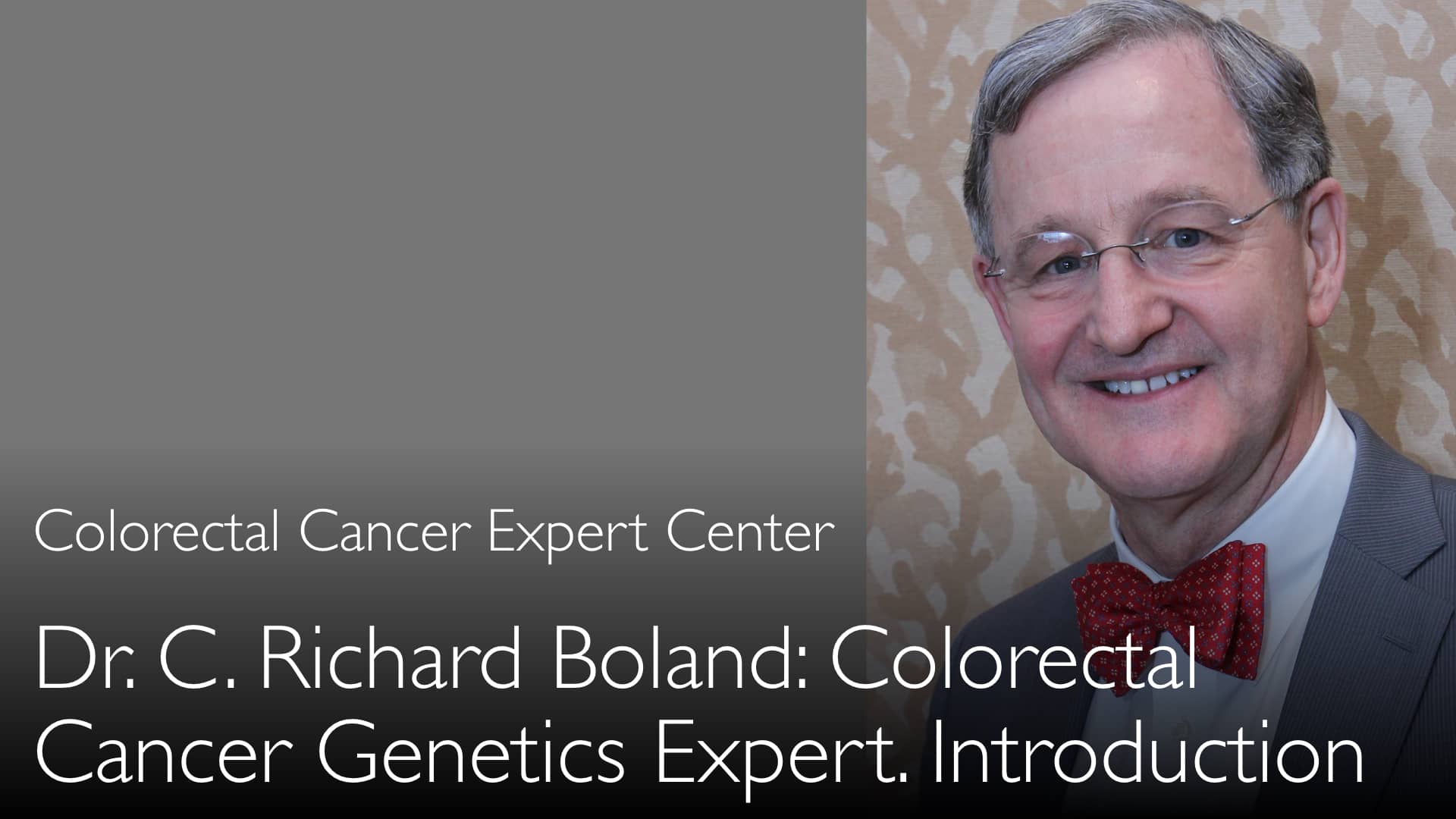Leading expert in colorectal cancer genetics, Dr. C. Richard Boland, MD, explains how familial colon cancer syndromes develop through different genetic pathways, including Lynch syndrome, adenomatous polyposis, and rare conditions like Juvenile Polyposis and Peutz-Jeghers syndrome. He highlights how understanding these hereditary patterns reveals colorectal cancer as a collection of distinct diseases with varying treatment responses.
Genetic Causes of Familial Colon Cancer: Syndromes and Treatment Implications
Jump To Section
- Familial Colon Cancer Overview
- Lynch Syndrome Explained
- Adenomatous Polyposis and APC Gene
- Rare Hereditary Syndromes
- Colorectal Cancer as Diverse Diseases
- Diagnosis and Treatment Implications
- Full Transcript
Familial Colon Cancer Overview
Dr. C. Richard Boland, MD, emphasizes that 10-25% of familial colorectal cancer cases stem from Lynch syndrome, while other genetic causes account for additional hereditary patterns. Early-onset colon cancer across generations often signals these inherited syndromes, each with distinct biological mechanisms driving cancer development.
Lynch Syndrome Explained
As Dr. Boland describes, Lynch syndrome arises from DNA repair defects rather than polyp formation. While adenomas develop at normal rates, their rapid progression to malignancy distinguishes this syndrome. This explains why patients with Lynch syndrome frequently develop colorectal cancer before age 50, requiring specialized surveillance protocols.
Adenomatous Polyposis and APC Gene
The APC gene mutation causes familial adenomatous polyposis (FAP), where hundreds of polyps form due to uncontrolled cellular growth. Dr. C. Boland, MD, notes that while individual polyps may have low cancer risk, the overwhelming quantity makes malignancy inevitable. This contrasts with Lynch syndrome's repair-based mechanism, demonstrating how different pathways lead to similar clinical outcomes.
Rare Hereditary Syndromes
Dr. C. Richard Boland, MD identifies two uncommon conditions: Juvenile Polyposis Syndrome (caused by tumor suppressor gene mutations) and Peutz-Jeghers Syndrome (linked to kinase gene inactivation). These account for a small percentage of hereditary cases but provide critical insights into colorectal cancer biology through their unique genetic signatures.
Colorectal Cancer as Diverse Diseases
Dr. C. Boland, MD, explains that genetic research has transformed our understanding of colorectal cancer from a single disease to a spectrum of distinct conditions. Dr. C. Boland, MD, emphasizes this diversity explains why some tumors respond to standard treatments while others prove resistant, necessitating personalized approaches based on each tumor's molecular profile.
Diagnosis and Treatment Implications
Dr. C. Richard Boland, MD stresses that recognizing these genetic differences enables targeted prevention and therapy. For high-risk families, genetic testing can identify specific syndromes early, allowing for customized surveillance and prophylactic measures. This paradigm shift toward precision medicine improves outcomes by matching interventions to each patient's unique genetic risk factors.
Full Transcript
Dr. Anton Titov, MD: Can colon cancer run in the family? How does the age of onset of colorectal cancer indicate possible genetic causes? What types of familial colorectal cancer are common?
A leading colorectal cancer genetics expert discusses colon cancer. Let's speak about other familial colorectal cancer syndromes. You are a Dr. Anton Titov, MD. But your lifelong interest and achievements in colon cancer treatment and research are driven not only by scientific curiosity, but also by personal history of your entire family.
You have just published a book titled "Cancer Family: The Search for the Cause of Hereditary Colorectal Cancer." In that book, you tell a dramatic story of several generations of your own family. Many members of your family had colon cancer at a young age.
Dr. Anton Titov, MD: We already spoke about one familial colorectal cancer syndrome—Lynch syndrome. But Lynch syndrome is responsible only for about 10 to 25% of cases of familial colorectal cancer. What do we know about other genetic causes of colorectal cancer that might happen across several generations of one family?
Dr. C. Boland, MD: Understanding the problem of hereditary colon cancer has taught us a huge amount about the pathogenesis of colorectal cancer. The very first gene for hereditary colon cancer that was found was the APC gene. Germline mutations in the APC gene cause adenomatous polyposis.
What happens is, when you have an inactivation of the APC gene, you get excessive uncontrolled proliferation of cells. So you get lots of polyps in the large bowel. Eventually, the colon polyps will grow. When you have so many polyps—even though one by one any given adenomatous polyp statistically is relatively unlikely to become a colon cancer—but when you have so many, it becomes an overwhelming likelihood that you will get colorectal cancer.
In adenomatous polyposis, colon cancer risk is completely based upon alterations in the regulation of growth of large bowel polyps. In Lynch syndrome, the colon cancer risk is caused by a DNA repair problem. Colon adenomas occur at ordinary rates, as far as we can tell. But then those adenomas are very likely to become malignant in a short period of time because of the DNA repair problem.
There are some other relatively uncommon hereditary colon cancer problems. They have to do with completely different genes altogether. But these other hereditary colon cancer syndromes are quite rare.
One of them is Juvenile Polyposis Syndrome. There are several genes that cause it—those are inactivating mutations in genes that are called tumor suppressor genes. Patients lose tumor suppressor function, and cancers can occur.
There is another germline mutation in a kinase gene. When that is inactivated, you get Peutz-Jeghers syndrome.
Dr. C. Boland, MD: As we have uncovered the cause of each of these syndromes, we have learned more about colon cancer. The unexpected finding is this: We always thought colon cancer was one uniform disease, but now we know that colon cancer is really a collection of very diverse diseases.
This explains why some colon cancers respond to the usual treatments and some don't respond to treatment at all. They are just different diseases.





